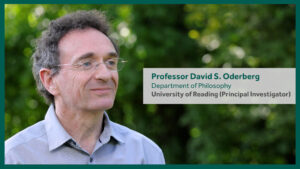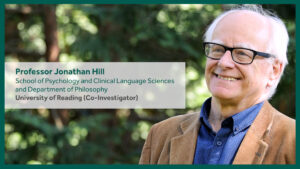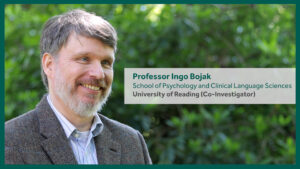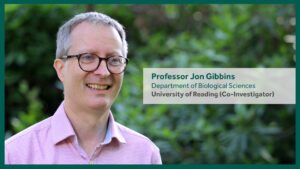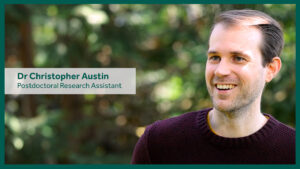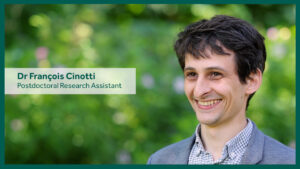Principal Investigator:
David S. Oderberg is Professor of Philosophy at the University of Reading and current Head of Department. He is the author of six books including Real Essentialism (2007) and The Metaphysics of Good and Evil (2020), as well as editing or co-editing several others in logic, metaphysics, and ethics, including Classifying Reality (2013). He is also the author of over seventy articles in metaphysics, philosophy of biology, ethics, philosophy of religion, and other subjects. In 2013 Professor Oderberg delivered the George Hourani Lectures at SUNY Buffalo. He also edits Ratio, an international journal of analytic philosophy, and is a Senior Fellow of the Higher Education Academy, UK.
“As a neo-Aristotelian philosopher, I am fascinated by goal-directedness, or teleology – to use the traditional term. I see it as an objective phenomenon embedded in reality in various ways, but in the world of living organisms it takes on a special character that, as many think, is hard to explain fully in physico-chemical terms. As a team, we are investigating the concept of mistake in biology and how an understanding of biological mistakes can help us generate testable empirical hypotheses of use to the working biologist. In particular, we are focusing on the blood clotting system and how it might be susceptible to mistakes that can help us investigate the system in novel, testable ways.”
Co-investigator:
Jonathan Hill is Professor of Child and Adolescent Psychiatry, and Professorial Research Fellow in Philosophy, at the University of Reading, UK. He is also a practising psychiatrist in the UK NHS. He has published widely in behavioural science, including a book co-authored with Derek Bolton, Mind, Meaning and Mental Disorder (2004).
“As a clinician, and a researcher into developmental processes in psychopathology, it has seemed to me that there are important and still unresolved questions regarding causal processes in the behavioural sciences and mental disorder. In Mind, Meaning and Mental Disorder, Bolton and I sought to show how these questions can be addressed by starting with an examination of causal processes throughout biology, which have the illuminating and intrinsically linked properties of directedness and mistake-proneness. In this project, I will work with philosophical and scientific colleagues to further develop and scrutinise these, and allied ideas, in light of current philosophical controversies. We will use these ideas to generate and test novel scientific hypotheses.”
Co-investigator:
Ingo Bojak is Professor in the School of Psychology & Clinical Language Sciences at the University of Reading, and its Deputy Head. Although a theoretical physicist by training, he has worked as a computational neuroscientist for the last two decades, being particularly interested in modelling the collective activity of neurons. For applications, he has focused on general anaesthesia, brain connectivity, multimodal neuro-imaging, and advanced data analysis. He has also recently started working on projects in computational psychology, e.g., reinforcement learning.
“I have maintained an active interest in philosophy, in particular in Aristotelian metaphysics. My research has been interdisciplinary in nature, and I have worked in physics, (bio)engineering, medical neuroscience, and psychology in Germany, Australia, the Netherlands, and now the UK. In our project I will be responsible for turning our philosophical ideas into computational structures that can deal with empirical data.”
Co-investigator:
Jon Gibbins is Professor of Cell Biology at the University of Reading, UK, where he is Director of the Institute for Cardiovascular & Metabolic Research. He has spent the last 25 years figuring out how blood clotting is controlled, how and why this is may occur in disease, and how the blood cells that trigger this process, platelets, might be controlled to prevent heart attacks and strokes. This work involves a combination of cell and molecular biology, through models of disease, to clinical studies with patients. Jon’s work has led to the discovery of new systems of blood cell regulation and the development of new therapies to combat thrombotic disease.
“In this project, I will be responsible for exploring and testing our philosophical ideas with data from the study of platelets – a relatively simple biological system with plenty of scope for the making of mistakes that can have substantial physiological consequences.”
Postdoctoral Research Assistant:
Dr. Christopher J. Austin’s research specialisation is in Metaphysics and Philosophy of Science, with a particular focus on ontology, modality, and causation in the context of evolutionary developmental biology. He has written on a diverse range of topics including natural kind theory, process ontology, mechanistic explanation, information theory, structuralism, dispositional causation, persistence and identity, truthmaking theory, biological essentialism, and dynamical systems theory. He is the author of Essence In the Age of Evolution: A New Theory of Natural Kinds (2019), as well as a number of chapters in edited volumes including Neo-Aristotelian Perspectives on Contemporary Science (Routledge) and Evolutionary Developmental Biology: A Reference Guide (Springer). His work has been published in a wide range of philosophical journals including Synthese, Analysis, The European Journal for Philosophy of Science, Biology and Philosophy, Ratio, and Metascience.
“In this project, I will be contributing to the team effort of understanding the nature of biological mistakes metaphysically. As a neo-Aristotelian philosopher, my focus is on the teleology, or goal-directedness that living systems exhibit in both their development and function as they navigate their environments. In my role, I aid the team in philosophically interpreting the data of the biological sciences and helping to shape conceptual frameworks within which new empirical hypotheses can be formed.”
Postdoctoral Research Assistant:
Dr François Cinotti initially trained as a computational neuroscientist and his past work has mainly focused on modelling learning and decision-making behaviour using reinforcement learning. He completed his PhD on the role of dopamine in decision-making in 2019 at the Institute for Intelligent Systems and Robotics in Paris. He then pursued a first postdoctoral project at the University of Nottingham developing a novel Bayesian method for quantifying connection rates between neurons, and a second project at the University of Oxford modelling a foraging task.

